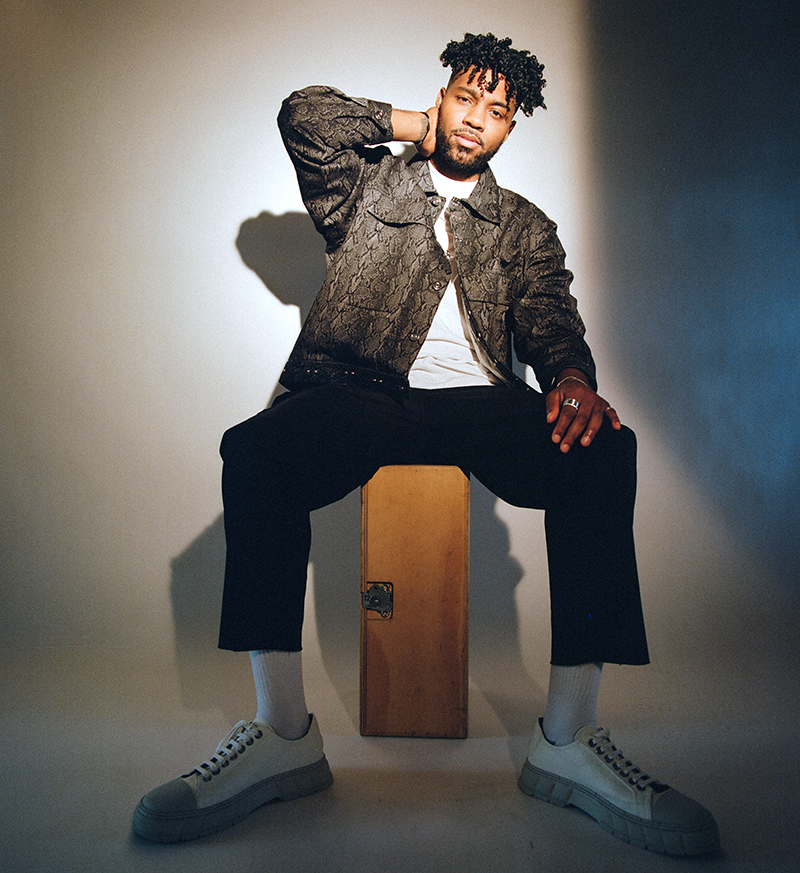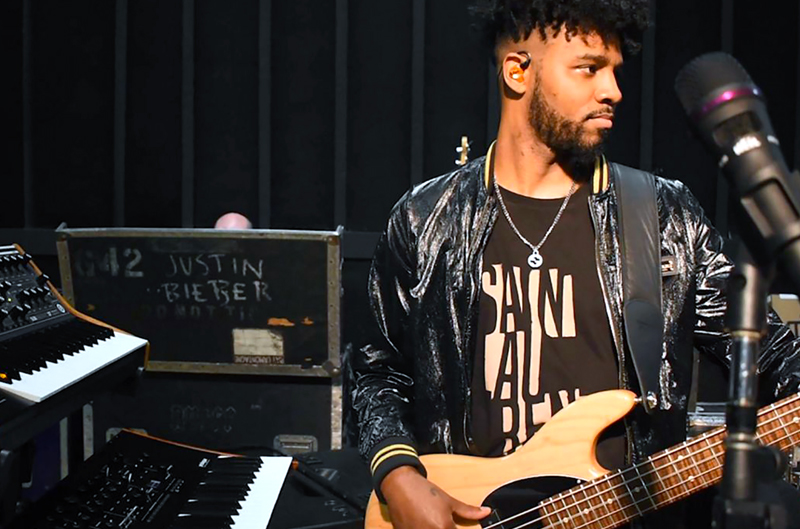
At 9 years old, Bernard Harvey was a small, skinny kid hauling a giant cello case home from school each day in Kansas City, Kansas. Today, at 35, HARV is an A-list bassist and music producer living in Los Angeles. For the last five years, he’s been Justin Bieber’s music director.
During the pandemic, despite all the disruptions to the traditional process of studio recording, HARV managed to produce a smash hit: Peaches, the lead single on Bieber’s new Justice album. Both the song and the album debuted at Number One on their respective Billboard charts.
IN Kansas City caught up with HARV when he was back in town for a short visit recently. The multi-instrumentalist talked about his roots in Rosedale and Argentine, why he likes practicing more than performing, and shared that he had just gotten married a week earlier.
What brings you back to Kansas City this weekend?
Actually, my grandfather, who was 96, passed. So, I’m here for the funeral.
I’m sorry for your loss.
Thank you. He had a great life. He was an awesome man, and it’s a celebration, so I’m not sad at all.
What was your favorite thing about your grandfather?
His patience. He had probably the most patience of any human I’ve ever met in my life, and that’s what I learned and inherited from him.
When you come home to Kansas City, what are some of your must-haves and must-dos?Must-dos for sure are eat at Jack Stack, Gates, Arthur Bryant’s, LC’s, and Q39. So, barbecue. Yeah, I have to have barbecue, from the moment I get back to the city.
How’s the barbecue in LA?
Not good at all. [Laughs] There’s one barbecue restaurant in LA I like, but it’s not at all like Kansas City barbecue.
You grew up in Kansas City, Kansas. What neighborhood did you live in?
I’m kind of like a hybrid. I grew up in Rosedale and went to Frank Rushton Elementary School and Rosedale Middle School. Then I moved to Argentine and graduated from JC Harmon High School.
What are your memories of Rosedale and Argentine?
I remember walking home from school and stopping at the park and playing basketball. And then around 9 when I started playing instruments, I remember always being the kid walking home with this big cello case—that was my first instrument. I remember all the kids asking me why I played such a big instrument when I was so small.
Why did you?
I picked the cello because somebody had already picked the violin and the viola. So, I think the cello chose me.
What instruments came next, and in what order?
So cello was first at 9. Then around 10 and 11 I started playing the drums. And then at 12, 13 I picked up the bass guitar, and that became my thing. Then senior year I picked up the piano and the guitar. Once I went to college, I had to learn everything, just for my studies.
What did you like about the drums, and why did you end up switching to the bass?
I like the drums because it’s fun to play, and it’s the loudest thing you can play in a band, but I’m a cool guy—like, a reserved guy—and I can play the bass and not sweat. So, I thought, “OK, this is my instrument.” I could get done with a show and I’m not sweaty, and I could go to the bar and say, “Gimme a beer” and still be cool.
The drummers, they get done playing, they’re sweaty. They look like they just played four quarters of a football game.
The bass became your forte. Was it just another instrument at the time, or did you feel an immediate connection, like this was the instrument you were supposed to play?
It was an instant connection. And I come from a musical family so my older brother growing up, his first instrument was the piano, and then my younger brother plays the drums. It made sense that I would play bass, just to complete the band.
At JC Harmon High School, you were in marching band—what instrument did you play?
I was a drum major.
What was your favorite thing about marching band?
Believe it or not, my favorite thing about marching band was practice. Just practicing the songs and the field routines. That was more fun to me than actual performances.
Why?
Getting things together and working out all the kinks has always been fun for me.
That’s interesting.
Plus, the performances go by so fast, you don’t get to really enjoy it. Let’s say you work on something for a week and a half, and then the performance only lasts two minutes—that’s for the crowd. For me, it’s the build up to it. It’s like that for me now, with Justin [Bieber]. The rehearsals and the practices—that’s the fun part.
At Alabama State University, you got a degree in Music Technology. What is that?
That means you study how to be a composer, like a music producer or music engineer. It’s still music, but I didn’t want to major in performance or music education, because I didn’t want to be a teacher, and I didn’t want to be in a symphony. From a young age I was always interested in composing and writing songs, so I wanted to study that. In courses, you learn computers, you learn about mics, everything that goes into the recording side of making music.
Did you go to Atlanta straight out of college?
Yep, directly out of college. Alabama State is in Montgomery, so that’s about two hours from Atlanta. So, on the weekends, I would go to Atlanta to play in nightclubs or work in different studios until I made a name for myself in certain rooms in Atlanta. That made the transition really easy.
I read that you worked day and night on compositions when you first got to Atlanta. Is that true?
That’s true. And I still work day and night on compositions! [Laughs]
When you compose, do you have your hands on an instrument?
Yes. Ten times out of ten. If I’m composing, I have my hands on either a guitar or a piano.
“I work in every genre. On Monday I might work with hip-hop artists. Tuesday I may work with the biggest EDM (electronic dance music) DJ. Then Wednesday, I may work with the biggest R&B artist. Then Thursday I’m with Justin, the biggest pop artist.”
You went to college on a jazz scholarship. How did you end up moving into pop and hip hop?
I work in every genre. On Monday I might work with hip-hop artists. Tuesday I may work with the biggest EDM (electronic dance music) DJ. Then Wednesday, I may work with the biggest R&B artist. Then Thursday I’m with Justin, the biggest pop artist.
Do you have a sense of where all those genres are headed? What new impulses are you hearing?
I’d say in general, after the pandemic, people want real music and real concepts and that is what’s going to prevail over the trendy TikTok songs.
You found success quickly, playing bass guitar on recordings like Lemonade by Gucci Mane and A Kiss by Eminem, and then in 2010 you went out on the road playing bass for Justin Bieber. What was that road tour like?
Like an ongoing tour that is still going on to this day. [Laughs] In 2010, I started working with Justin as just a bassist, and now I’m his musical director. I’ve been on every world tour he’s ever done. I’ve seen every little crevice of the world. I’ve been able to experience so many different cultures and see so many different beautiful people and gain different perspectives on life. I’m truly blessed that I’ve been able to do that through music, and I didn’t have to pay for it. [Laughs]
How is a road tour with a band different than how it is portrayed in movies?
Well, a lot of that stuff is true. It’s a movie so they’ve got to add stuff to spice it up, but 70 percent of it is true. There are a lot of highs and lows, being on the road. There are a lot of things that happen.
We have a really, really good core of people that we travel with, so we don’t really have some of the hard times because we really enjoy each other’s company.

Is there anything Justin Bieber’s fans don’t already know about him that is interesting?
No. They know everything. His fans probably know what he had for lunch today. His fans are intense, so I can’t tell you anything they don’t already know, unless it’s a song we are working on.
You must be close to Justin after traveling all over the world with him for more than ten years. What is your favorite thing about him as a person?
He’s so big, he has so many fans, but he’s so humble, while still being Justin Bieber, if that makes sense. He’s truly humble.
For instance, I just got married last week, and he came to my wedding and performed, and he was so supportive of me and my wife. People were asking him for pictures, and he was asking people if they wanted pictures, and that’s just his true character.
Congratulations on your marriage.
Thank you!
Who is your wife?
I married Felisha King from the R&B group Cherish. They had a number one hit in 2006, Do It to It. She is my wife, Felisha Harvey now, and I am the happiest man on the planet.
Interview condensed and minimally edited for clarity.

